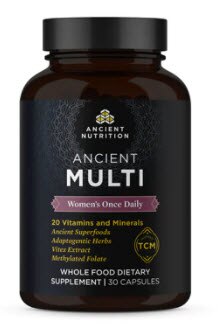While the “standard American diet” (or a typical Western diet) is typically not lacking in calories, often times people eating diets that include lots of packaged and processed foods fail to consume enough essential nutrients.
Nutrient deficiencies are those in key vitamins and minerals, as well as amino acids and fatty acids, that we must get from our diets because our bodies cannot make them on their own.
Believe it or not, certain deficiencies are very common, for example those in iron, vitamin D, and magnesium, among others. Depending on the specific nutrient you’re lacking, you may deal with symptoms such as fatigue, muscle weakness, trouble concentrating and impaired immune function.
What’s the best way to boost your intake of nutrients that are most often missing from adults’ diets? As explained more below, a healthy diet plus high-quality supplements can go a long way in preventing nutrient deficiency symptoms.
Common vitamin deficiencies
Vitamin D
Around 30% to 40% or more of adults in the U.S are believed to be vitamin D deficient. This fat-soluble vitamin isn’t found in many foods, rather our bodies produce vitamin D from when our skin is directly exposed to sunlight. Because many people avoid spending time in the sun, or they live far from the equator where it’s dark for many hours a day in the winter, this explains why this is such a common problem.
Iron
Iron deficiency is most likely to impact women of child-bearing age, vegetarians/vegans who avoid eating animal proteins, and young children who might not get enough from foods. Some authorities recommend people and children consume iron-fortified foods to boost their levels and prevent anemia, since this important mineral is needed to carry oxygen throughout the blood, for healthy cognitive function and much more.
Magnesium
This mineral is involved in numerous enzyme reactions that take place in the body every day, including those that support the structure and function of our muscles, heart, bones and teeth. It’s belied that almost half of the U.S. adult population may be lacking magnesium, especially the elderly who may not absorb it well, and those with conditions like diabetes, metabolic syndrome, heart disease and substance abuse.
Vitamin B6 and B12
These vitamins are needed to keep your energy level up and for healthy nerve and cognitive functions, as well as blood formation. Plant-based eaters who don’t eat meat, eggs or fish are most likely to deficient, as well as elderly adults who can struggle with absorption, and people with a genetic defect that causes them to be B12 deficient.
Calcium/potassium
Calcium and potassium are electrolytes that are found in many of the same foods, such as dairy products and vegetables. Low intake is most common in older women, to a lesser extent in older men, and in people who avoid dairy foods and certain veggies, fruits and potatoes. This is problematic because both of these minerals play important roles in bone health, heart health, nerve functions and growth/development in younger people.
Vitamin deficiency symptoms to look for
How do you know if you’re vitamin or mineral deficient? Symptoms will vary depending on which nutrients you’re in need of.
Here are some of the most common symptoms attributed to deficiencies such as those mentioned above, many of which can be caused by multiple different types of deficiencies, too:
- Fatigue/low energy
- Muscle weakness, cramps and spasms
- Bone loss and increased risk of fractures and osteoporosis later in life
- In children, growth delays, development issues and and soft bones
- Weakened immune system
- Impaired brain function
- Megaloblastic anemia, which is a blood disorder that enlarges your red blood cells
- Elevated homocysteine levels, which is a risk factor for several diseases including heart disease
- Blood disorders
- Poor digestion
- Migraines
- Restless leg syndrome
- Abnormal heart rhythms
Supplement solutions
Supplements can often be beneficial, and sometimes even medically necessary, for anyone who can’t obtain enough vitamins and minerals from their diet alone.
A good quality multivitamin, such as one that is food-based which supports absorption, will usually contain 100% or more of all essential vitamins and minerals, including those above which are common deficiencies such as calcium and potassium. This can be a great option for helping to fill in multiple gaps in your diet, but check product labels carefully so you understand how much of each nutrient you’re consuming.
Another strategy is taking individual vitamins/minerals that you’re running low in, such as enzyme-activated magnesium or vitamin D3 (the type the body absorbs best). If you’re very deficient, this will be the best way to bring your levels up since you can control how much you consume.
Depending on your needs, consider taking:
It’s also important to check the ingredients list when choosing a vitamin. While many supplements can be included on a plant-based diet, some may contain added ingredients from animal sources, which may not be suitable for strict vegans.
In addition to consuming the supplements mentioned above, eating a healthy, well-rounded diet is another important step to obtaining all the nutrients you require. Some of the best food choices for providing the vitamins and minerals above (as well as many other nutrients) include:
- Red meat such as grass-fed beef
- Organ meats like liver
- Shellfish like clams, mussels and oysters
- Fatty fish like salmon, mackerel, sardines and trout
- Beans and legumes
- Seeds like pumpkin, sesame, hemp and flax seeds
- Dark, leafy greens and veggies like broccoli, kale and spinach
- Dairy products
- Eggs (especially egg yolks)
- Dark chocolate/cocoa
- Nuts like almonds and walnuts
- Whole grains like oats, quinoa and brown rice
*Be sure to consult with your healthcare provider if you suspect vitamin or nutrient deficiencies. These statements have not been approved by the Food and Drug Administration. These products are not intended to diagnose, treat, cure or prevent disease.


